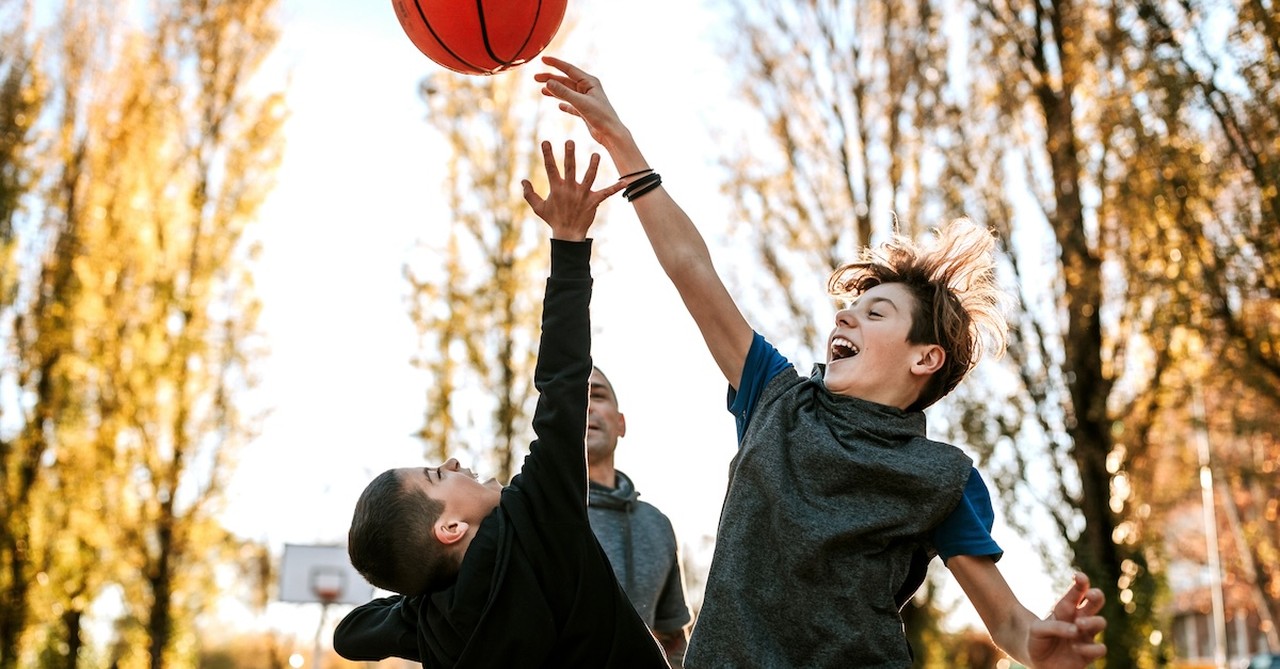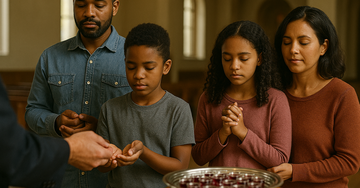3 Ways to Help Your Children's Faith Grow This Summer

Summer break is around the corner, and I, like many other parents, find myself in this strange tension of excitement and trepidation. My children aren’t “littles” anymore. Long gone are the summers of splash pads and afternoon naps. Now, I’m juggling a full-blown teenager and another one just on the cusp. In response to all the “church ladies” who told me “not to blink” when I brought my babies home, I have to finally acquiesce and agree that they do grow up too fast—though in the throes of sleep deprivation and getting spit up on I didn’t find that advice all that helpful. Nevertheless, here we are, somewhere in the messy middle of parenting where there aren’t organized mommy groups to support and feed middle school and high school moms; but if you’ve arrived at this season of parenting you know just how vital it is to tend to your child’s spiritual growth.
Hopefully, you’ve already given your preteens and teens a good start. You’ve read them their children’s Bible, their Action Bible [which is a fantastic version for engaging boys], you’ve brought them to Sunday school, watched Veggie Tales with them until your eyeballs fell out, and spent time with them in prayer. You’ve sent them to your local church’s Vacation Bible School and maybe even gone the extra step and done some mission work with them.
All signs point in the right direction, but then the hormones, relational confusion, growth spurts, fatigue, eating everything in the house, acne—all of these things hit seemingly at once, and then we are left wondering if we ever parented these young people a day in their lives. Oh, and this doesn’t even take into account the incredibly confusing worldviews being shoved down their throats by public schools, popular media, and their peers.
As parents, we might be tempted to double down on all of these good things: More Bible! More prayer! More church! More Christian music and worship, church camp and youth group, books by Christian authors, and every Jesus-y thing that we can get our hands on. All of these inclinations are great, but as our children are rapidly on the cusp of adulthood, it is also time to consider some new ideas.
As parents, hopefully, we are all concerned for our children’s spiritual growth. I’m assuming you’ve read this far into this article because you want tangible ways to nurture this growth. The great news is that caring is half the battle. You’ve cared enough to lay the foundation in their formidable years, but now, as our children enter their adolescence it’s time to pivot. Our children and now critical thinkers and questioning their worldviews. They have serious questions about faith, the world, culture, and themselves. It’s time to create a culture within our homes for conversation and even doubt.
In her book Saving Leonardo, Professor Nancy Pearcey references a Fuller Youth Institute study that backs the idea that when adolescents are given space to wrestle with their doubts, it actually deepens and strengthens their faith. Becoming a safe space to wrestle with doubts might sound scary to us as parents, but it turns out that our children really need this.
So, how do we brave the waters of becoming a safe place for doubt without accidentally wading into deconstructionism?
I’m glad you asked, but first, a story:
Our home has become “the house.” You know, the one all the kids come to for plentiful snacks, open doors, and rides to youth group. In full confession, we’re literally just around the corner from the Middle School, and have enticed our son’s friends with tacos. My husband and I have created an environment with firm boundaries: kids have learned that they are to leave phones on the entryway console when they come over, and they have learned to respect the inhabitants of this home and to watch their mouths (because goodness, middle schoolers and their language). We are pretty firm, but we’re also as absolutely hospitable and welcoming as possible, which means we have lots of food and that when the kids are over we’re floating around and occasionally inserting ourselves into their conversations.
A couple years ago a new kid started coming over. This child vehemently told me that he was an atheist. I remember how dogmatic he was in telling me this. I smiled at the kid, told him that he was welcome here and asked if he likes pico de gallo on his tacos. Within a few months he started catching a ride with us to youth group. A few months after that he asked me what Easter is all about. A few months after that he asked me how to pray.
I don’t think this young man is a follower of Christ by any means, but I do see a spiritual hunger in him. And he is not the only one. In order to help satiate this spiritual hunger, I’m learning to incorporate three simple and important elements into my parenting. As you head into the hot summer months, I encourage you to do these three things intentionally, and in so doing, you might just change the spiritual trajectory of your children’s lives and the lives of their friends. These three things are going to sound wildly simple and almost laughably easy, but in application they are going to require you to be inconvenienced, likely irritated, and in a position of taking initiative. In order to take seriously the spiritual growth of your children this summer, remember these two words, “Open Up.”
Step One: Open Up Your Heart

Step One: Open Up Your Heart
SLIDE 1 OF 4
If you are a parent, which I assume you are because you’re still reading this article, you have an opportunity to meet your child on their terms. We’ve already discussed all the factors that adolescents are currently facing, but the reality is that we just don’t know what we don’t know. We don’t know what young people today are internalizing. We likely don’t know what it’s like to be challenged with worldviews antithetical to a Christian worldview. We don’t know what it’s like to have LGBTQ+ literature in our middle school libraries (if your child is in public school), we don’t know what it’s like to have gender-neutral bathrooms in our school or to have to compete against trans-athletes or forfeit, and we don’t know what it’s like to our gender challenged by our own peers at such a critical time of physical and cognitive development. Sure, we had our own challenges in our upbringing, but the challenges our children face are almost incomprehensible to us. Given these factors and more, our hearts must be incredibly tender towards our children and their friends. Keeping a tender heart opens us up in empathy to pray over the intricate aspects of our children’s lives. It helps us orient ourselves towards prayer, not just for our children but for their friends, the other children in their schools—and by extension—families in our communities.
This summer, consider starting a prayer journal in which you record your prayers over your children and all of their friends. Next, model this for your children. Engage your children in prayer, praying with them, over them, and for their friends. Modeling an active prayer life for your children may have a massive ripple effect.
Step Two: Open Up Your Home

Step Two: Open Up Your Home
SLIDE 2 OF 4
I’ll be completely transparent when I tell you that this part is hard for me. Opening up my home means that I’m inviting loud, messy, stinky and sometimes crude teenage boys into my home. And when I say stinky, I really mean it. I love a clean house. I love order. I really love quiet. Becoming “the house” means that my house is going to get messy, disorderly, and very loud, but becoming “the house” also means that I get to walk out my Christian faith right in front of my children. Through meals and conversation the gospel is shared. My children observe that a life dedicated to Christ is a life lived in action. We do not close ourselves off from the rest of the world, instead we dig in, get messy and become as inclusive as possible.
Photo credit: ©GettyImages/Pekic
Step Three: Open Up Your Head

Step Three: Open Up Your Head
SLIDE 3 OF 4
Okay, so you’ve become “the house,” now what? Now, you listen, serve, and attend to the needs of your children and their friends. You feed them, stay engaged, invite them (youth group or Bible study), and create an environment where your children and their friends can ask the hard questions.
This part may feel somewhat tedious, but creating a safe environment in which young people can ask questions about faith will be fundamental in their spiritual development. Now, this part might make you feel nervous. “What if I don’t have all the answers?” “What if my own child stumps me?” My 10-year-old daughter stumps me all the time, but I’m willing to engage in a conversation with her. Sometimes the best response is, “I don’t know the answer, but I’d love to research and pursue that with you.” The reality is that we don’t have to know it all, but Christian responsibility means being open to learning and wrestling. Don’t be in a rush to answer questions; instead be humble and willing to grow alongside your children. Who knows, their questions might actually drive you to a deeper faith.
Bonus Step: Open Up Your Wallet

Bonus Step: Open Up Your Wallet
SLIDE 4 OF 4
In opening up my heart, home, and head, I quickly learned that a fourth step was necessary. I had to open my wallet, because snacks and tacos are expensive. Gas money for driving all the kids everywhere they want to go is expensive. Engaging our children and facilitating spiritual growth will always come at a cost, and, more often than not, that cost is monetary. Additionally, the cost can be our time, or our preferences when we make choices that benefit our children and their friends more than ourselves. As Scripture reminds us time and time again, walking in faith is costly, but hopefully, when it comes to our children’s spiritual growth, we count that cost as gain.
Rachel Baker is the author of Deconstructed, a Bible study guide for anyone who feels overwhelmed or ill-equipped to study the word of God. She is a pastor’s wife and director of women’s ministries, who believes in leading through vulnerability and authenticity. She is a cheerleader, encourager, and sometimes drill-sergeant. She serves the local church alongside her husband, Kile, in Northern Nevada. They have two amazing kiddos and three dogs. Rachel is fueled by coffee, tacos, and copious amounts of cheese. For more on her and her resources to build your marriage, see her website: www.rachelcheriebaker.com or connect with her on Instagram at @hellorachelbaker.
Originally published June 06, 2025.






